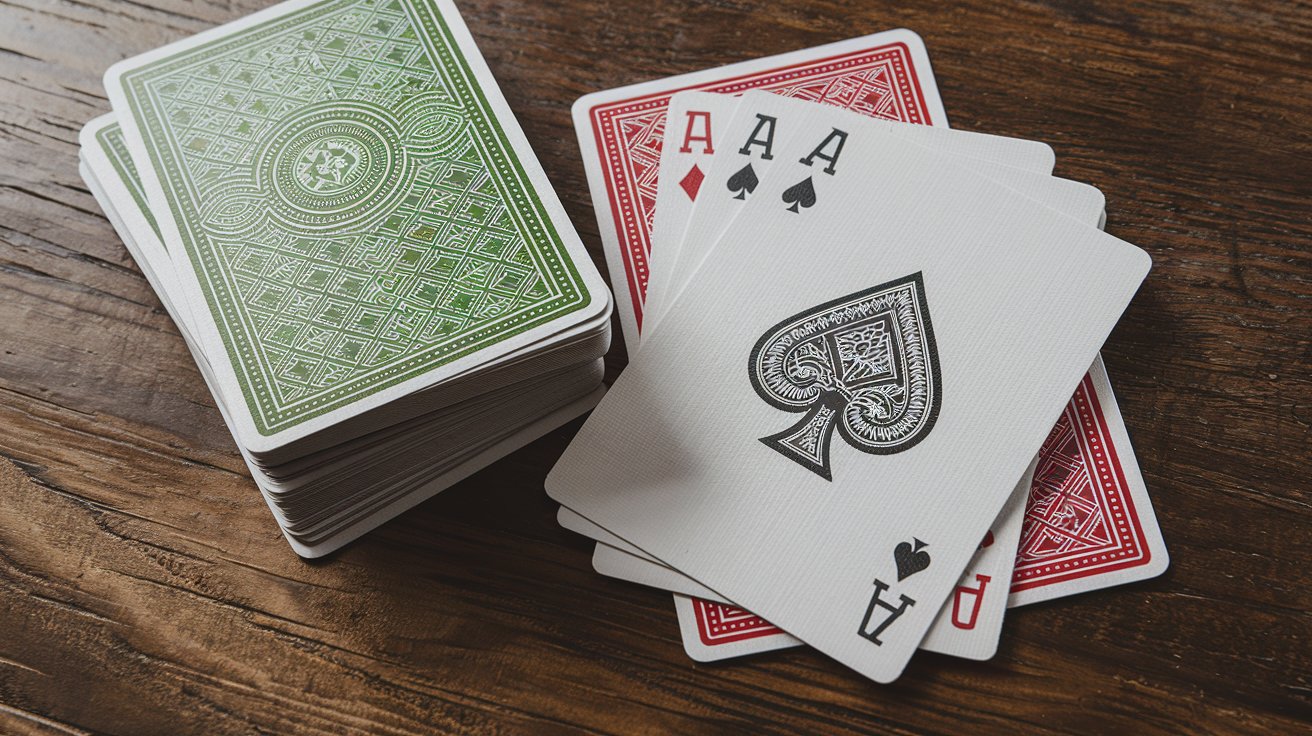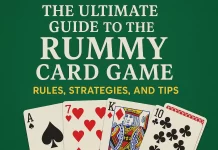Playing card games has been a beloved pastime for centuries, transcending cultures and generations. Whether you’re gathering around a kitchen table for a family game night or competing in high-stakes tournaments, card games offer a perfect blend of skill, strategy, and social interaction. In this comprehensive guide, we’ll explore everything from fundamentals to advanced tactics that can elevate your card game prowess and help you develop winning strategies.
Understanding the Basics of Card Games
Types of Card Games
Card games broadly fall into several categories, each requiring different skills and approaches:
- Trick-taking games like Hearts, Spades, and Bridge involve players trying to win “tricks” by playing the highest card of the suit led.
- Matching games like Rummy and Mahjong require players to form specific combinations of cards.
- Shedding games like Crazy Eights and UNO aim to be the first to discard all cards.
- Accumulating games like Blackjack focus on collecting cards of specific values without exceeding a target.
- Gambling card games like Poker combine skill with betting mechanisms.
Standard Deck Structure
A standard deck consists of 52 cards divided into four suits (hearts, diamonds, clubs, and spades), with 13 cards in each suit (Ace, 2-10, Jack, Queen, and King). Understanding card rankings and suit relationships is fundamental to most card games.
Basic Terminology
Before diving deeper, familiarize yourself with common card game terminology:
- Hand: The cards dealt to each player
- Trick: A round where each player plays one card
- Trump: A designated suit that outranks all others
- Bid: Declaring how many tricks you expect to win
- Draw: Taking additional cards from a deck or pile
- Discard: Removing cards from your hand to a discard pile
Popular Card Games and How to Play Them
Poker
Poker is perhaps the most famous card game in the world, combining probability, psychology, and strategic thinking. The basic objective is to win chips by either having the best hand or convincing others to fold.
Quick Start Guide:
- Each player receives private cards (hole cards)
- Community cards are dealt face-up
- Players bet in rounds, with options to check, call, raise, or fold
- The best five-card combination wins
Key Strategy Elements:
- Position at the table matters enormously
- Starting hand selection is crucial
- Calculating pot odds helps make profitable decisions
- Reading opponents’ betting patterns reveals information
Bridge
Bridge is the ultimate partnership card game, requiring communication and coordination.
Quick Start Guide:
- Partners sit across from each other
- The game begins with an auction (bidding) phase
- The highest bidder becomes the declarer
- The declarer’s partner becomes the dummy, exposing their cards
- The declarer plays both their hand and the dummy’s
- Teams try to fulfill their contract (bid)
Key Strategy Elements:
- Bidding systems communicate hand strength and distribution
- Card counting is essential
- Planning the entire play sequence before playing the first card
Rummy
Rummy games focus on forming sets (three or four of a kind) and runs (consecutive cards of the same suit).
Quick Start Guide:
- Players receive a hand of cards
- On each turn, draw a card and discard one
- Form sets and runs
- The first to arrange their entire hand into valid combinations wins
Key Strategy Elements:
- Track discards to determine what opponents are collecting
- Balance between completing your own combinations and blocking opponents
- Know when to change strategy based on game progression
Essential Skills for Card Game Success

Card Counting and Memory
While often associated with Blackjack, card counting is valuable in many card games. It doesn’t require extraordinary memory but rather systematic tracking of key cards.
Practice Exercise: After playing a game, try to recall which important cards were played and by whom. Over time, this will become second nature.
Probability Assessment
Understanding probability transforms card games from chance-based activities to skill-based competitions.
Key Probability Concepts:
- Basic odds: Knowing the chances of drawing specific cards
- Conditional probability: How odds change as cards are revealed
- Expected value: Calculating the average outcome of decisions
Example: In Poker, if you need one specific card to complete a straight and there are 46 unseen cards with 4 that help you, your probability of getting that card on the next draw is approximately 8.7%.
Pattern Recognition
Successful card players identify patterns in both the cards and their opponents’ behavior.
Pattern Types:
- Recurring card sequences
- Betting patterns that signal hand strength
- Timing patterns (quick plays vs. hesitations)
- Physical tells (in face-to-face games)
Building Winning Strategies
Game-Specific Strategies
Each card game requires unique approaches:
For Poker:
- Tight-aggressive play: Being selective about hands but aggressive when playing
- Position-based strategy: Playing differently based on your position relative to the dealer
- Bankroll management: Protecting your money through proper bet sizing
For Bridge:
- Signal systems: Using conventional bids and plays to communicate
- Defensive strategies: Maximizing tricks when not declaring
- End-game tactics: Planning for the final tricks
For Collectible Card Games (like Magic: The Gathering):
- Deck construction: Building synergistic card combinations
- Meta-game awareness: Understanding prevalent strategies in the current competitive environment
- Tech cards: Including specific counters to popular strategies
Adaptability and Reading the Table
Great card players adjust their strategies based on:
- Opponent tendencies: Some players are aggressive, others cautious
- Current game state: Leading vs. trailing requires different approaches
- Time pressure: Late-game situations often demand riskier plays
- Table dynamics: Multi-player politics in games like Hearts
Risk Management
Every card game involves managing risk:
- Expected value calculations: Determining if a play’s potential reward justifies its risk
- Variance management: Choosing plays that reduce harmful swings of luck
- Risk allocation: Taking calculated risks when the potential reward is highest
Psychology of Card Games
Reading Opponents
People unconsciously reveal information through:
- Timing tells: Hesitation often indicates uncertainty
- Betting patterns: Consistent bet sizing can signal hand strength
- Physical tells: Changes in posture, breathing, or hand movements
- Conversation patterns: Topics and tone often change with hand quality
Psychological Tactics
Ethical psychological play can provide advantages:
- Table image: Cultivating a specific reputation to exploit later
- Mixed strategies: Varying play to remain unpredictable
- Selective aggression: Using forceful play strategically to unsettle opponents
- Emotional control: Maintaining focus regardless of game outcomes
Practice Methods to Improve Your Game
Deliberate Practice Techniques
Improve faster with structured practice:
- Hand analysis: Review interesting hands after sessions
- Scenario drilling: Practice specific situations repeatedly
- Study with intent: Focus on one aspect of the game at a time
- Play with better players: Learning happens fastest against skilled opponents
Using Technology to Improve
Modern technology offers powerful learning tools:
- Card game apps: Practice against AI opponents
- Online simulators: Test strategies without financial risk
- Strategy software: Analyze optimal plays in complex situations
- Training videos: Learn from expert commentary
Tracking Progress
Measure improvement through:
- Performance metrics: Track wins, losses, and specific statistics
- Challenge progression: Systematically tackle increasingly difficult opponents
- Skill assessment tools: Use available software to identify strengths and weaknesses
Resources for Card Game Enthusiasts
Books Worth Reading
Whether you’re a beginner or seeking to refine advanced skills, these books offer valuable insights:
- For Poker: “The Theory of Poker” by David Sklansky
- For Bridge: “Bridge for Dummies” by Eddie Kantar
- For general card strategy: “Thinking in Bets” by Annie Duke
Online Communities
Connect with fellow enthusiasts through:
- Reddit communities specific to your favorite card games
- Strategy forums where hands and tactics are analyzed
- Discord servers for real-time discussion and advice
Tournaments and Events
Participate in competitive play through:
- Local card clubs and game stores
- Regional tournaments
- Online competitions
- Casual meetups through platforms like Meetup.com
Final Thoughts
Card games represent a perfect intersection of skill, strategy, socialization, and fun. Whether you’re playing for relaxation or competition, the principles covered in this guide can help you enjoy deeper, more rewarding gaming experiences.
Remember that becoming proficient at card games is a journey that rewards patience and persistence. Even expert players continue learning throughout their careers. The beauty of card games lies in their infinite depth—there’s always another level of understanding to achieve.
Start by mastering one game rather than dabbling in many. As your fundamental skills develop, you’ll find they transfer readily to other card games. Focus on consistent improvement rather than results, especially early in your journey.
Most importantly, maintain the spirit of enjoyment that drew you to card games in the first place. The most successful players are often those who maintain genuine enthusiasm for the intellectual challenge and social connection that card games provide.
What’s your favorite card game? Which strategies have worked best for you? Leave a comment below, and let’s continue the conversation!

Zareb Saleh is a journalist at Gulf Today and a ghostwriter for Gameoholic, specializing in gaming, technology, and digital culture. With a keen eye for industry trends, he delivers insightful stories that engage and inform readers.




